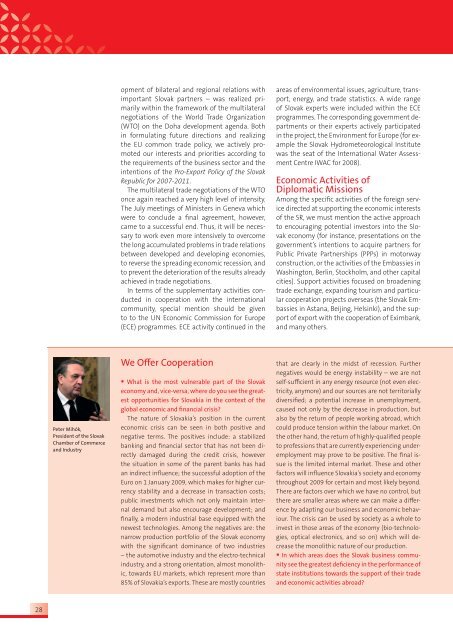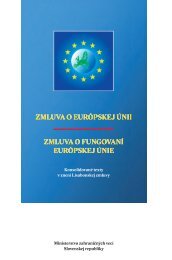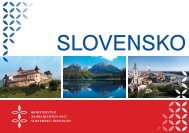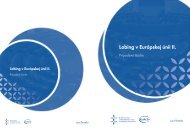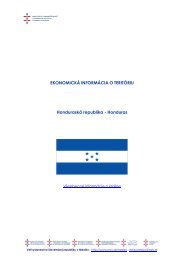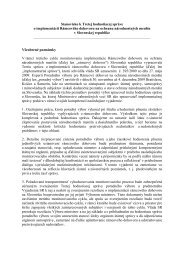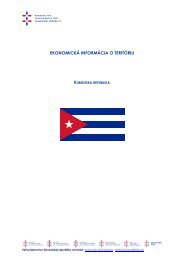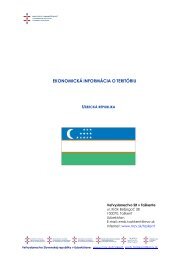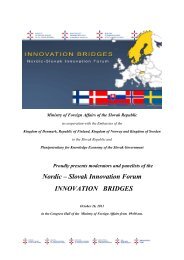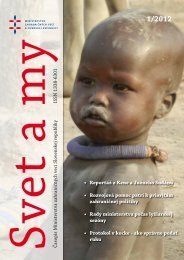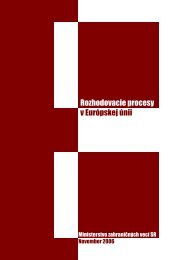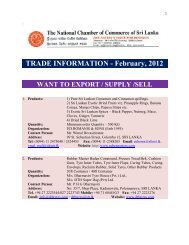Annual Report Ministry of Foreign Affairs of the Slovak Republic 2008
Annual Report Ministry of Foreign Affairs of the Slovak Republic 2008
Annual Report Ministry of Foreign Affairs of the Slovak Republic 2008
You also want an ePaper? Increase the reach of your titles
YUMPU automatically turns print PDFs into web optimized ePapers that Google loves.
opment <strong>of</strong> bilateral and regional relations with<br />
important <strong>Slovak</strong> partners – was realized primarily<br />
within <strong>the</strong> framework <strong>of</strong> <strong>the</strong> multilateral<br />
negotiations <strong>of</strong> <strong>the</strong> World Trade Organization<br />
(WTO) on <strong>the</strong> Doha development agenda. Both<br />
in formulating future directions and realizing<br />
<strong>the</strong> EU common trade policy, we actively promoted<br />
our interests and priorities according to<br />
<strong>the</strong> requirements <strong>of</strong> <strong>the</strong> business sector and <strong>the</strong><br />
intentions <strong>of</strong> <strong>the</strong> Pro-Export Policy <strong>of</strong> <strong>the</strong> <strong>Slovak</strong><br />
<strong>Republic</strong> for 2007-2011.<br />
The multilateral trade negotiations <strong>of</strong> <strong>the</strong> WTO<br />
once again reached a very high level <strong>of</strong> intensity.<br />
The July meetings <strong>of</strong> Ministers in Geneva which<br />
were to conclude a final agreement, however,<br />
came to a successful end. Thus, it will be necessary<br />
to work even more intensively to overcome<br />
<strong>the</strong> long accumulated problems in trade relations<br />
between developed and developing economies,<br />
to reverse <strong>the</strong> spreading economic recession, and<br />
to prevent <strong>the</strong> deterioration <strong>of</strong> <strong>the</strong> results already<br />
achieved in trade negotiations.<br />
In terms <strong>of</strong> <strong>the</strong> supplementary activities conducted<br />
in cooperation with <strong>the</strong> international<br />
community, special mention should be given<br />
to to <strong>the</strong> UN Economic Commission for Europe<br />
(ECE) programmes. ECE activity continued in <strong>the</strong><br />
areas <strong>of</strong> environmental issues, agriculture, transport,<br />
energy, and trade statistics. A wide range<br />
<strong>of</strong> <strong>Slovak</strong> experts were included within <strong>the</strong> ECE<br />
programmes. The corresponding government departments<br />
or <strong>the</strong>ir experts actively participated<br />
in <strong>the</strong> project, <strong>the</strong> Environment for Europe (for example<br />
<strong>the</strong> <strong>Slovak</strong> Hydrometeorological Institute<br />
was <strong>the</strong> seat <strong>of</strong> <strong>the</strong> International Water Assessment<br />
Centre IWAC for <strong>2008</strong>).<br />
Economic Activities <strong>of</strong><br />
Diplomatic Missions<br />
Among <strong>the</strong> specific activities <strong>of</strong> <strong>the</strong> foreign service<br />
directed at supporting <strong>the</strong> economic interests<br />
<strong>of</strong> <strong>the</strong> SR, we must mention <strong>the</strong> active approach<br />
to encouraging potential investors into <strong>the</strong> <strong>Slovak</strong><br />
economy (for instance, presentations on <strong>the</strong><br />
government’s intentions to acquire partners for<br />
Public Private Partnerships (PPPs) in motorway<br />
construction, or <strong>the</strong> activities <strong>of</strong> <strong>the</strong> Embassies in<br />
Washington, Berlin, Stockholm, and o<strong>the</strong>r capital<br />
cities). Support activities focused on broadening<br />
trade exchange, expanding tourism and particular<br />
cooperation projects overseas (<strong>the</strong> <strong>Slovak</strong> Embassies<br />
in Astana, Beijing, Helsinki), and <strong>the</strong> support<br />
<strong>of</strong> export with <strong>the</strong> cooperation <strong>of</strong> Eximbank,<br />
and many o<strong>the</strong>rs.<br />
Peter Mihók,<br />
President <strong>of</strong> <strong>the</strong> <strong>Slovak</strong><br />
Chamber <strong>of</strong> Commerce<br />
and Industry<br />
We Offer Cooperation<br />
What is <strong>the</strong> most vulnerable part <strong>of</strong> <strong>the</strong> <strong>Slovak</strong><br />
economy and, vice-versa, where do you see <strong>the</strong> greatest<br />
opportunities for <strong>Slovak</strong>ia in <strong>the</strong> context <strong>of</strong> <strong>the</strong><br />
global economic and financial crisis?<br />
The nature <strong>of</strong> <strong>Slovak</strong>ia’s position in <strong>the</strong> current<br />
economic crisis can be seen in both positive and<br />
negative terms. The positives include: a stabilized<br />
banking and financial sector that has not been directly<br />
damaged during <strong>the</strong> credit crisis, however<br />
<strong>the</strong> situation in some <strong>of</strong> <strong>the</strong> parent banks has had<br />
an indirect influence; <strong>the</strong> successful adoption <strong>of</strong> <strong>the</strong><br />
Euro on 1 January 2009, which makes for higher currency<br />
stability and a decrease in transaction costs;<br />
public investments which not only maintain internal<br />
demand but also encourage development; and<br />
finally, a modern industrial base equipped with <strong>the</strong><br />
newest technologies. Among <strong>the</strong> negatives are: <strong>the</strong><br />
narrow production portfolio <strong>of</strong> <strong>the</strong> <strong>Slovak</strong> economy<br />
with <strong>the</strong> significant dominance <strong>of</strong> two industries<br />
– <strong>the</strong> automotive industry and <strong>the</strong> electro-technical<br />
industry, and a strong orientation, almost monolithic,<br />
towards EU markets, which represent more than<br />
85% <strong>of</strong> <strong>Slovak</strong>ia’s exports. These are mostly countries<br />
that are clearly in <strong>the</strong> midst <strong>of</strong> recession. Fur<strong>the</strong>r<br />
negatives would be energy instability – we are not<br />
self-sufficient in any energy resource (not even electricity,<br />
anymore) and our sources are not territorially<br />
diversified; a potential increase in unemployment,<br />
caused not only by <strong>the</strong> decrease in production, but<br />
also by <strong>the</strong> return <strong>of</strong> people working abroad, which<br />
could produce tension within <strong>the</strong> labour market. On<br />
<strong>the</strong> o<strong>the</strong>r hand, <strong>the</strong> return <strong>of</strong> highly-qualified people<br />
to pr<strong>of</strong>essions that are currently experiencing underemployment<br />
may prove to be positive. The final issue<br />
is <strong>the</strong> limited internal market. These and o<strong>the</strong>r<br />
factors will influence <strong>Slovak</strong>ia’s society and economy<br />
throughout 2009 for certain and most likely beyond.<br />
There are factors over which we have no control, but<br />
<strong>the</strong>re are smaller areas where we can make a difference<br />
by adapting our business and economic behaviour.<br />
The crisis can be used by society as a whole to<br />
invest in those areas <strong>of</strong> <strong>the</strong> economy (bio-technologies,<br />
optical electronics, and so on) which will decrease<br />
<strong>the</strong> monolithic nature <strong>of</strong> our production.<br />
In which areas does <strong>the</strong> <strong>Slovak</strong> business community<br />
see <strong>the</strong> greatest deficiency in <strong>the</strong> performance <strong>of</strong><br />
state institutions towards <strong>the</strong> support <strong>of</strong> <strong>the</strong>ir trade<br />
and economic activities abroad?<br />
28


